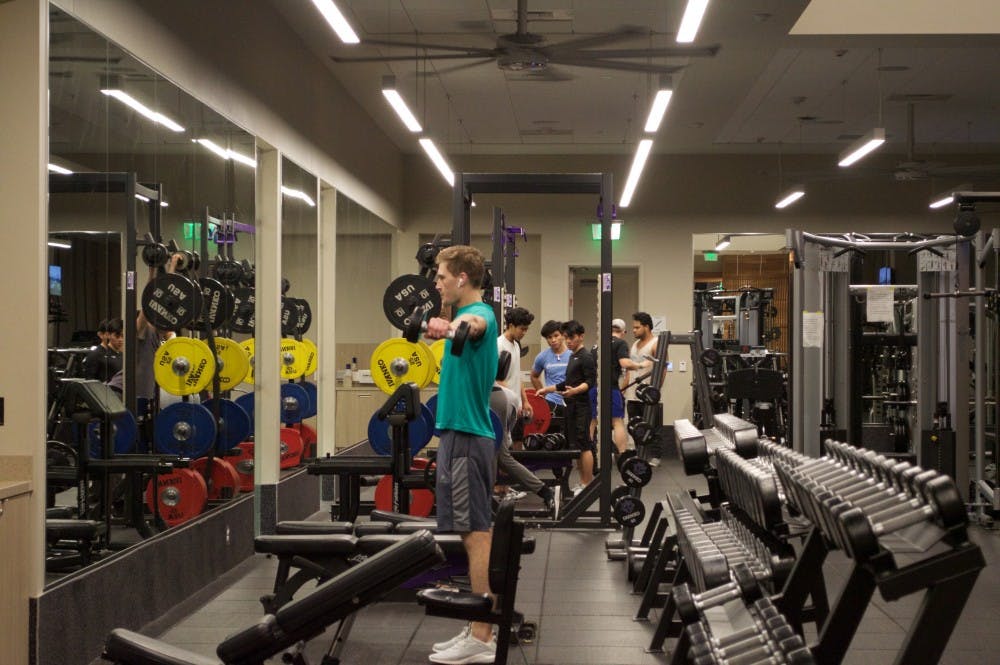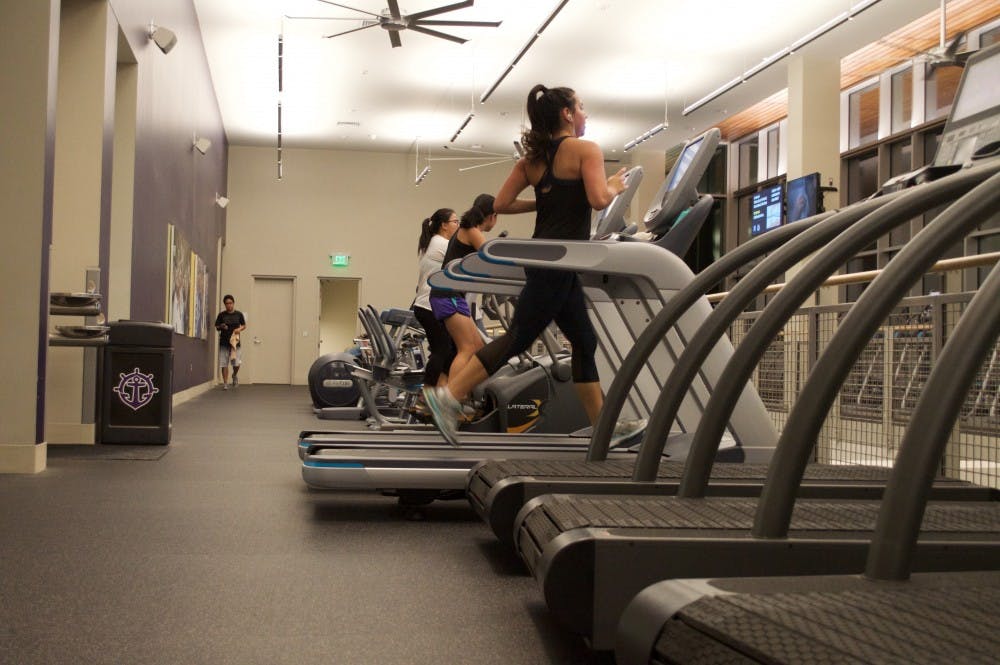With crispy chicken strips and addictive fries at the Pilot House, nine seasons of The Office on Netflix and the newfound freedom of college, staying healthy and active at school can be more difficult than it was back home. Whether you’re a freshman or senior, it’s undeniable that healthy eating and self-care often takes the back burner when you have to juggle school, jobs and a social life.
Some freshmen even might worry about the “freshman 15,” a.k.a. the weight gain that can happen when freshmen come to college. Tanya Bachman, nutrition instructor in the School of Nursing, said weight gain and unhealthy eating habits are common in college.
“I think it’s very common, not every single person is going to experience it but it is common,” Bachman said. “It’s being away from home and learning how to feed yourself, at the same time balancing academic load.”
Whether or not you believe in the freshman 15, everyone can agree that staying healthy in college is hard — both mentally healthy and physically healthy. The Beacon put together a list of 15 ways to stay healthy this semester.
1. Watch what you’re eating
It may be easy to get Pilot House chicken strips, fries or pizza slices for every meal when they’re so available, but you can lose track of healthy eating if you don’t have a balanced diet.
“Try to stick with the healthiest options, which is going to mean more often than not eating at the commons,” Bachman said. “Stay away from the fried foods as much as possible.”
Oatmeal and acai bowls for breakfast and Pilot bowls and salad for lunch and dinners are good ways to get your servings of fruits, protein and veggies in.
“Bon app actually has very healthy options,” Sophomore Kaylie Haas said, “Obviously, if you're in the mood for some chicken strips you get those chicken strips, but they do have healthier options like pilot bowls and salads.”
2. Don’t skip meals
Never have time for breakfast in the mornings? It’s so easy to skip breakfast, but don’t. Another way to be healthy is to eat meals consistently.
“People get into the habit of sleeping as long as they can before their 8 a.m. classes and not taking time for breakfast.,” Bachman said. “Skipping meals can be really easy. Finding time for meals and making them a priority is important.”
3. Avoid unhealthy snacking
Your study group might always bring snacks to your late-night study sessions, but check yourself before you’re suddenly three doughnuts and two bags of chips in. Avoiding late-night snacking and being conscientious about when to eat is a key factor in staying healthy as well as feeling good.
“It’s really easy to skip meals,” Haas said. “And it’s bad for you because then you’ll just binge on a bunch of snacks later.”

Chicken strips in the Pilot House.
4. Avoid sugary coffee drinks
Caffeine is a must in college, but drinking too many sugary coffees and caffeinated drinks is also often a factor in weight gain and unhealthy eating lifestyles. For example, a 16 oz. mocha frappuccino is packed with 61 grams of sugar, according to Starbucks’ website.
“Watch sugar content in your foods,” Bachman said, “A lot of things that are easily accessible, like a mocha, are often packed with sugar.”
5. Stay hydrated
There are water fountains everywhere on campus, so to stay healthy, increase water intake and make sure to not get dehydrated. Though it varies depending on the person, a general rule is to drink 64 ounces (or eight 8 oz. glasses) of water a day.
“A lot of times we don’t drink enough water, and when we crave something sweet we often are just dehydrated,” Kaitlin Bourne, recreation operations program manager at Beauchamp and yoga instructor, said. “It’s a really easy way to increase health and make wiser food intake decisions.”
6. Take vitamins
A good way to get in necessary vitamins and to feel better is to take daily supplements. Good ones to consider are a daily multivitamin, fish oil, vitamin B and vitamin D. Also the occasional Emergen-C packet can help boost your immune system.
“Especially during winter, take vitamin D supplements,” Haas said, “It helps boost energy and helps if you have seasonal depression.”
7. Use the Beauchamp Center
A great resource to remain healthy is the Beauchamp recreation center, which is open 6 a.m. to 12 a.m. Monday through Thursday, 10 a.m. to 10 p.m. Friday and Saturday, and 10 a.m. to 12 a.m. Sunday.
“Working out puts me in a really good mindset to get work done,” Sydney Livingston, freshman environmental science major, said. “Honestly, it can be the highlight of my day sometimes.”
Though some students might want to hit the gym every day, finding time in a busy schedule to actually follow through can be difficult.
“A good idea for freshman would be to pre-plan their week (schedule) and make a goal to come to the gym a few times a week,” Bourne said.

Students lift weights in the Beauchamp center.
8. Take a fitness class
Going to the gym and using the machines and weights can be daunting (wait, how do you actually use a squat rack?), but there are other ways to get in exercise at Beauchamp, such as fitness classes.
“When they come into the gym to fitness classes, they’re going to make new friends with similar interests in healthy environments,” Bourne said.
The Beauchamp center offers a variety of different classes, such as cycling, kickboxing, Zumba and Oula, with times for each available on their website. These classes are usually well attended by students.
“I go to the spin classes here and I come back and I’m happy and pumped and ready to do everything,” Livingston said.
9. Try yoga and meditation
Beauchamp also provides yoga and meditation classes to help students de-stress and improve mental health.
“We have about five yoga classes, morning and evening,” Bourne said. “It’s a great way to make a mind-body connection and develop strength and flexibility.”

Chips in Mack's Market.
10. Get active with your friends
A great way to get in shape is to do it with friends. One way can be going to the gym with a group or a friend to keep you accountable.
But another option is hiking. Oregon and the PNW is basically the outdoorsy capital of the US (or at least we like to think so). The Beauchamp center offers outdoor pursuit programs for students looking to get off campus and explore beautiful PNW.
11. Have personal check-ins
Among classes, homework and social life, many students don’t take time to reflect on their day and their lives. One good way to practice self-care is to check in with yourself by writing, meditating or talking with people you are close with.
“Ask ‘what have I eaten today?’ or ‘when’s the last time I got some exercise?’” Haas said. “It’s nice to take a break and just reflect.”
12. Utilize the Health and Counseling Center
If you feel sick or need someone to talk to, the Health and Counseling Center is always there as a resource.
To schedule an appointment, call 503.943.7134 between 8:30 a.m. and 4:30 p.m. Monday through Friday.
13. Get a good amount of sleep
Physical health is not the only important factor of being a healthy student. Mental and emotional health are vital in personal wellness. One way to practice self-care for mental health is to get a good amount of sleep.
“If you need to miss a class to get sleep or self-care, then do it. If you really need time for yourself, take it because your health is so important,” Haas said.
14. Get off campus
A good way to clear your mind is to explore Portland. There are plenty of fun places off-campus to go, and whether you’re thrift shopping on Hawthorne or picnicking at the Pittock Mansion, having a fun day with you friends can be a great way to get your mind off of school.
“I stayed on-campus a lot during the weekends and I wish I had gone places more,” Haas said.
15. Don’t be too hard on yourself
It is also important to remember that the weight gain is perfectly natural, and to not be ashamed of it.
“I don't like the term ‘the freshman 15’,” Bourne said. “There's just such a negative connotation to it and I think that it’s quite normal for someone to gain weight when they make a big change in their life.”










